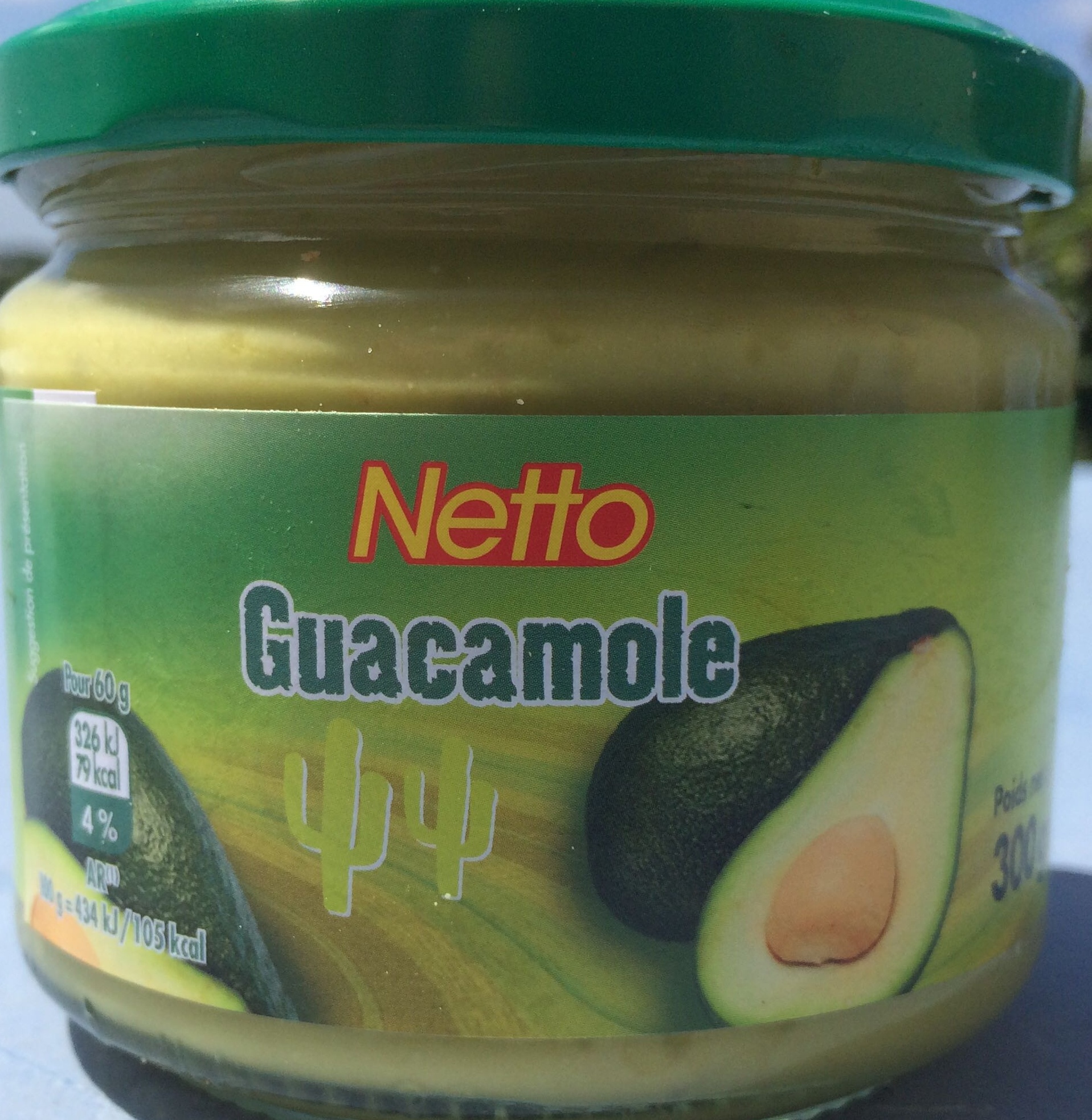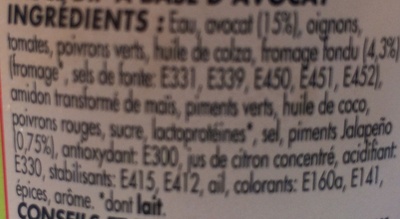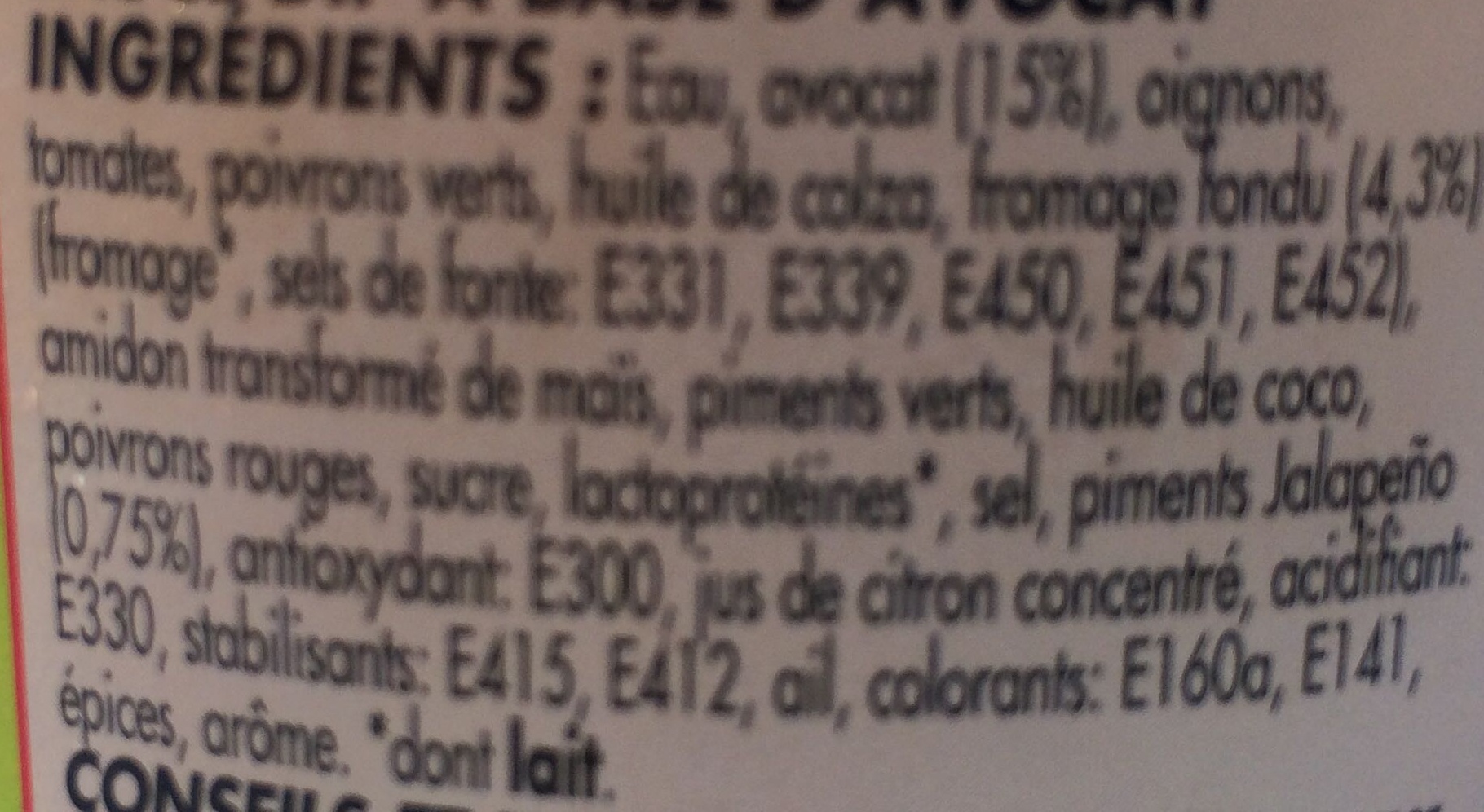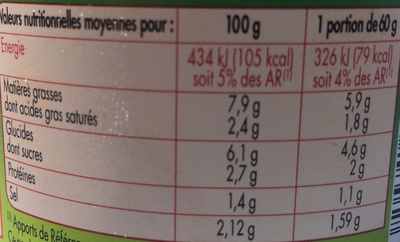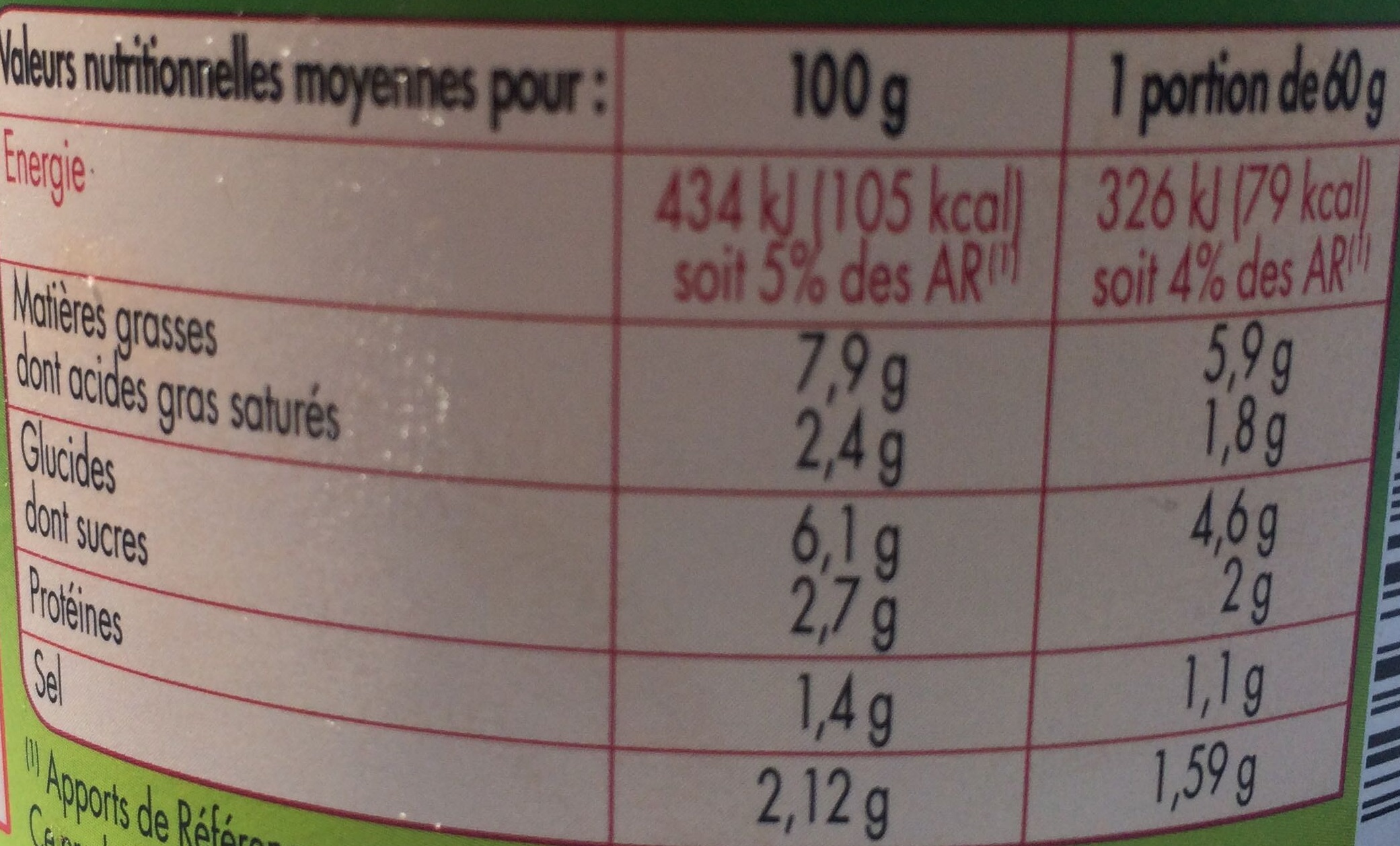Help us make food transparency the norm!
As a non-profit organization, we depend on your donations to continue informing consumers around the world about what they eat.
The food revolution starts with you!
Guacamole - Netto - 300 g
Guacamole - Netto - 300 g
This product page is not complete. You can help to complete it by editing it and adding more data from the photos we have, or by taking more photos using the app for Android or iPhone/iPad. Thank you!
×
Barcode: 3250391821754 (EAN / EAN-13)
Common name: Guacamole, sauce dip à base d'avocat
Quantity: 300 g
Packaging: Metal, Glass, Pot, Lid
Brands: Netto
Categories: Plant-based foods and beverages, Plant-based foods, Condiments, Spreads, Plant-based spreads, Sauces, Dips, Guacamoles, Groceries
Labels, certifications, awards: Made in Belgium
Manufacturing or processing places: Belgique, Snack Food Poco Loco, 8800 Roeselare
Stores: Netto
Countries where sold: France
Matching with your preferences
Health
Ingredients
-
38 ingredients
: Eau, avocat 15%, oignons, tomates, poivrons verts, huile de colza, fromage fondu 4,3% (fromage (dont lait), sels de fonte (E331, E339, E450, E451, E452), amidon transformé de maïs, piments verts, huile de coco, poivrons rouges, sucre, lactoprotéines (dont lait), sel, piments Jalapeño 0,75%, antioxydant (E300), jus de citron concentré, acidifiant (E330), stabilisants (E415, E412), ail, colorants (E160a, E141), épices, arômeAllergens: Milk, fr:lactoproteines
Food processing
-
Ultra processed foods
Elements that indicate the product is in the 4 - Ultra processed food and drink products group:
- Additive: E141 - Copper complexes of chlorophylls and chlorophyllins
- Additive: E14XX - Modified Starch
- Additive: E160a - Carotene
- Additive: E412 - Guar gum
- Additive: E415 - Xanthan gum
- Additive: E450 - Diphosphates
- Additive: E451 - Triphosphates
- Additive: E452 - Polyphosphates
- Ingredient: Colour
- Ingredient: Flavouring
- Ingredient: Milk proteins
Food products are classified into 4 groups according to their degree of processing:
- Unprocessed or minimally processed foods
- Processed culinary ingredients
- Processed foods
- Ultra processed foods
The determination of the group is based on the category of the product and on the ingredients it contains.
Additives
-
E160a - Carotene
Carotene: The term carotene -also carotin, from the Latin carota, "carrot"- is used for many related unsaturated hydrocarbon substances having the formula C40Hx, which are synthesized by plants but in general cannot be made by animals -with the exception of some aphids and spider mites which acquired the synthesizing genes from fungi-. Carotenes are photosynthetic pigments important for photosynthesis. Carotenes contain no oxygen atoms. They absorb ultraviolet, violet, and blue light and scatter orange or red light, and -in low concentrations- yellow light. Carotenes are responsible for the orange colour of the carrot, for which this class of chemicals is named, and for the colours of many other fruits, vegetables and fungi -for example, sweet potatoes, chanterelle and orange cantaloupe melon-. Carotenes are also responsible for the orange -but not all of the yellow- colours in dry foliage. They also -in lower concentrations- impart the yellow coloration to milk-fat and butter. Omnivorous animal species which are relatively poor converters of coloured dietary carotenoids to colourless retinoids have yellowed-coloured body fat, as a result of the carotenoid retention from the vegetable portion of their diet. The typical yellow-coloured fat of humans and chickens is a result of fat storage of carotenes from their diets. Carotenes contribute to photosynthesis by transmitting the light energy they absorb to chlorophyll. They also protect plant tissues by helping to absorb the energy from singlet oxygen, an excited form of the oxygen molecule O2 which is formed during photosynthesis. β-Carotene is composed of two retinyl groups, and is broken down in the mucosa of the human small intestine by β-carotene 15‚15'-monooxygenase to retinal, a form of vitamin A. β-Carotene can be stored in the liver and body fat and converted to retinal as needed, thus making it a form of vitamin A for humans and some other mammals. The carotenes α-carotene and γ-carotene, due to their single retinyl group -β-ionone ring-, also have some vitamin A activity -though less than β-carotene-, as does the xanthophyll carotenoid β-cryptoxanthin. All other carotenoids, including lycopene, have no beta-ring and thus no vitamin A activity -although they may have antioxidant activity and thus biological activity in other ways-. Animal species differ greatly in their ability to convert retinyl -beta-ionone- containing carotenoids to retinals. Carnivores in general are poor converters of dietary ionone-containing carotenoids. Pure carnivores such as ferrets lack β-carotene 15‚15'-monooxygenase and cannot convert any carotenoids to retinals at all -resulting in carotenes not being a form of vitamin A for this species-; while cats can convert a trace of β-carotene to retinol, although the amount is totally insufficient for meeting their daily retinol needs.Source: Wikipedia
-
E330 - Citric acid
Citric acid is a natural organic acid found in citrus fruits such as lemons, oranges, and limes.
It is widely used in the food industry as a flavor enhancer, acidulant, and preservative due to its tart and refreshing taste.
Citric acid is safe for consumption when used in moderation and is considered a generally recognized as safe (GRAS) food additive by regulatory agencies worldwide.
-
E331 - Sodium citrates
Sodium citrate: Sodium citrate may refer to any of the sodium salts of citrate -though most commonly the third-: Monosodium citrate Disodium citrate Trisodium citrateThe three forms of the salt are collectively known by the E number E331. Sodium citrates are used as acidity regulators in food and drinks, and also as emulsifiers for oils. They enable cheeses to melt without becoming greasy.Source: Wikipedia
-
E339 - Sodium phosphates
Sodium phosphates: Sodium phosphate is a generic term for a variety of salts of sodium -Na+- and phosphate -PO43−-. Phosphate also forms families or condensed anions including di-, tri-, tetra-, and polyphosphates. Most of these salts are known in both anhydrous -water-free- and hydrated forms. The hydrates are more common than the anhydrous forms.Source: Wikipedia
-
E412 - Guar gum
Guar gum (E412) is a natural food additive derived from guar beans.
This white, odorless powder is valued for its remarkable thickening and stabilizing properties, making it a common ingredient in various food products, including sauces, dressings, and ice creams.
When used in moderation, guar gum is considered safe for consumption, with no known adverse health effects.
-
E415 - Xanthan gum
Xanthan gum (E415) is a natural polysaccharide derived from fermented sugars, often used in the food industry as a thickening and stabilizing agent.
This versatile food additive enhances texture and prevents ingredient separation in a wide range of products, including salad dressings, sauces, and gluten-free baked goods.
It is considered safe for consumption even at high intake amounts.
-
E450 - Diphosphates
Diphosphates (E450) are food additives often utilized to modify the texture of products, acting as leavening agents in baking and preventing the coagulation of canned food.
These salts can stabilize whipped cream and are also found in powdered products to maintain their flow properties. They are commonly present in baked goods, processed meats, and soft drinks.
Derived from phosphoric acid, they're part of our daily phosphate intake, which often surpasses recommended levels due to the prevalence of phosphates in processed foods and drinks.
Excessive phosphate consumption is linked to health issues, such as impaired kidney function and weakened bone health. Though diphosphates are generally regarded as safe when consumed within established acceptable daily intakes, it's imperative to monitor overall phosphate consumption to maintain optimal health.
-
E451 - Triphosphates
Sodium triphosphate: Sodium triphosphate -STP-, also sodium tripolyphosphate -STPP-, or tripolyphosphate -TPP-,- is an inorganic compound with formula Na5P3O10. It is the sodium salt of the polyphosphate penta-anion, which is the conjugate base of triphosphoric acid. It is produced on a large scale as a component of many domestic and industrial products, especially detergents. Environmental problems associated with eutrophication are attributed to its widespread use.Source: Wikipedia
Ingredients analysis
-
May contain palm oil
Ingredients that may contain palm oil: E160a
-
Non-vegan
Non-vegan ingredients: Melted cheese, Cheese, Milk, Milk proteins, Milk
-
Maybe vegetarian
Ingredients that may not be vegetarian: Melted cheese, E160a, Flavouring
-
Details of the analysis of the ingredients
: Eau, avocat 15%, oignons, tomates, poivrons verts, huile de colza, fromage fondu 4.3%, _fromage_ (dont lait), sels de fonte (e331, e339, e450, e451, e452), amidon transformé de maïs, piments verts, huile de coco, poivrons rouges, sucre, _lactoprotéines_ (dont lait), sel, piments Jalapeño 0.75%, antioxydant (e300), jus de citron concentré, acidifiant (e330), stabilisants (e415, e412), ail, colorants (e160a, e141), épices, arôme- Eau -> en:water - vegan: yes - vegetarian: yes - ciqual_food_code: 18066 - percent_min: 15 - percent_max: 56
- avocat -> en:avocado - vegan: yes - vegetarian: yes - percent_min: 15 - percent: 15 - percent_max: 15
- oignons -> en:onion - vegan: yes - vegetarian: yes - ciqual_food_code: 20034 - percent_min: 4.3 - percent_max: 15
- tomates -> en:tomato - vegan: yes - vegetarian: yes - ciqual_food_code: 20047 - percent_min: 4.3 - percent_max: 15
- poivrons verts -> en:green-bell-pepper - vegan: yes - vegetarian: yes - ciqual_food_code: 20085 - percent_min: 4.3 - percent_max: 15
- huile de colza -> en:colza-oil - vegan: yes - vegetarian: yes - from_palm_oil: no - ciqual_food_code: 17130 - percent_min: 4.3 - percent_max: 14.7
- fromage fondu -> en:melted-cheese - vegan: no - vegetarian: maybe - ciqual_proxy_food_code: 12999 - percent_min: 4.3 - percent: 4.3 - percent_max: 4.3
- _fromage_ -> en:cheese - vegan: no - vegetarian: maybe - ciqual_proxy_food_code: 12999 - percent_min: 0.75 - percent_max: 4.3
- dont lait -> en:milk - vegan: no - vegetarian: yes - ciqual_proxy_food_code: 19051 - percent_min: 0.75 - percent_max: 4.3
- sels de fonte -> en:emulsifying-salts - percent_min: 0.75 - percent_max: 4.3
- e331 -> en:e331 - vegan: yes - vegetarian: yes - percent_min: 0.15 - percent_max: 4.3
- e339 -> en:e339 - vegan: yes - vegetarian: yes - percent_min: 0 - percent_max: 2.15
- e450 -> en:e450 - vegan: yes - vegetarian: yes - percent_min: 0 - percent_max: 1.43333333333333
- e451 -> en:e451 - vegan: yes - vegetarian: yes - percent_min: 0 - percent_max: 1.075
- e452 -> en:e452 - vegan: yes - vegetarian: yes - percent_min: 0 - percent_max: 0.86
- amidon transformé de maïs -> en:modified-corn-starch - vegan: yes - vegetarian: yes - ciqual_food_code: 9510 - percent_min: 0.75 - percent_max: 4.3
- piments verts -> en:green-chili-pepper - vegan: yes - vegetarian: yes - ciqual_food_code: 20151 - percent_min: 0.75 - percent_max: 4.3
- huile de coco -> en:coconut-oil - vegan: yes - vegetarian: yes - from_palm_oil: no - ciqual_food_code: 16040 - percent_min: 0.75 - percent_max: 4.3
- poivrons rouges -> en:red-bell-pepper - vegan: yes - vegetarian: yes - ciqual_food_code: 20087 - percent_min: 0.75 - percent_max: 4.3
- sucre -> en:sugar - vegan: yes - vegetarian: yes - ciqual_proxy_food_code: 31016 - percent_min: 0.75 - percent_max: 2.7
- _lactoprotéines_ -> en:milk-proteins - vegan: no - vegetarian: yes - percent_min: 0.75 - percent_max: 2.7
- dont lait -> en:milk - vegan: no - vegetarian: yes - ciqual_proxy_food_code: 19051 - percent_min: 0.75 - percent_max: 2.7
- sel -> en:salt - vegan: yes - vegetarian: yes - ciqual_food_code: 11058 - percent_min: 0.75 - percent_max: 2.12
- piments Jalapeño -> en:jalapeno-pepper - vegan: yes - vegetarian: yes - ciqual_food_code: 20151 - percent_min: 0.75 - percent: 0.75 - percent_max: 0.75
- antioxydant -> en:antioxidant - percent_min: 0 - percent_max: 0.75
- e300 -> en:e300 - vegan: yes - vegetarian: yes - percent_min: 0 - percent_max: 0.75
- jus de citron concentré -> en:concentrated-lemon-juice - vegan: yes - vegetarian: yes - ciqual_food_code: 2028 - percent_min: 0 - percent_max: 0.75
- acidifiant -> en:acid - percent_min: 0 - percent_max: 0.75
- e330 -> en:e330 - vegan: yes - vegetarian: yes - percent_min: 0 - percent_max: 0.75
- stabilisants -> en:stabiliser - percent_min: 0 - percent_max: 0.75
- e415 -> en:e415 - vegan: yes - vegetarian: yes - percent_min: 0 - percent_max: 0.75
- e412 -> en:e412 - vegan: yes - vegetarian: yes - percent_min: 0 - percent_max: 0.375
- ail -> en:garlic - vegan: yes - vegetarian: yes - ciqual_food_code: 11000 - percent_min: 0 - percent_max: 0.75
- colorants -> en:colour - percent_min: 0 - percent_max: 0.75
- e160a -> en:e160a - vegan: maybe - vegetarian: maybe - from_palm_oil: maybe - percent_min: 0 - percent_max: 0.75
- e141 -> en:e141 - vegan: yes - vegetarian: yes - percent_min: 0 - percent_max: 0.375
- épices -> en:spice - vegan: yes - vegetarian: yes - percent_min: 0 - percent_max: 0.75
- arôme -> en:flavouring - vegan: maybe - vegetarian: maybe - percent_min: 0 - percent_max: 0.75
Nutrition
-
Poor nutritional quality
⚠ ️Warning: the amount of fiber is not specified, their possible positive contribution to the grade could not be taken into account.⚠ ️Warning: the amount of fruits, vegetables and nuts is not specified on the label, it was estimated from the list of ingredients: 54This product is not considered a beverage for the calculation of the Nutri-Score.
Positive points: 1
- Proteins: 0 / 5 (value: 1.4, rounded value: 1.4)
- Fiber: 0 / 5 (value: 0, rounded value: 0)
- Fruits, vegetables, nuts, and colza/walnut/olive oils: 1 / 5 (value: 54.97734375, rounded value: 55)
Negative points: 12
- Energy: 1 / 10 (value: 434, rounded value: 434)
- Sugars: 0 / 10 (value: 2.7, rounded value: 2.7)
- Saturated fat: 2 / 10 (value: 2.4, rounded value: 2.4)
- Sodium: 9 / 10 (value: 848, rounded value: 848)
The points for proteins are not counted because the negative points are greater or equal to 11.
Nutritional score: (12 - 1)
Nutri-Score:
-
Nutrient levels
-
Fat in moderate quantity (7.9%)
What you need to know- A high consumption of fat, especially saturated fats, can raise cholesterol, which increases the risk of heart diseases.
Recommendation: Limit the consumption of fat and saturated fat- Choose products with lower fat and saturated fat content.
-
Saturated fat in moderate quantity (2.4%)
What you need to know- A high consumption of fat, especially saturated fats, can raise cholesterol, which increases the risk of heart diseases.
Recommendation: Limit the consumption of fat and saturated fat- Choose products with lower fat and saturated fat content.
-
Sugars in low quantity (2.7%)
What you need to know- A high consumption of sugar can cause weight gain and tooth decay. It also augments the risk of type 2 diabetes and cardio-vascular diseases.
Recommendation: Limit the consumption of sugar and sugary drinks- Sugary drinks (such as sodas, fruit beverages, and fruit juices and nectars) should be limited as much as possible (no more than 1 glass a day).
- Choose products with lower sugar content and reduce the consumption of products with added sugars.
-
Salt in high quantity (2.12%)
What you need to know- A high consumption of salt (or sodium) can cause raised blood pressure, which can increase the risk of heart disease and stroke.
- Many people who have high blood pressure do not know it, as there are often no symptoms.
- Most people consume too much salt (on average 9 to 12 grams per day), around twice the recommended maximum level of intake.
Recommendation: Limit the consumption of salt and salted food- Reduce the quantity of salt used when cooking, and don't salt again at the table.
- Limit the consumption of salty snacks and choose products with lower salt content.
-
-
Nutrition facts
Nutrition facts As sold
for 100 g / 100 mlAs sold
per serving (60 g)Compared to: Guacamoles Energy 434 kj
(104 kcal)260 kj
(62 kcal)-34% Fat 7.9 g 4.74 g -40% Saturated fat 2.4 g 1.44 g -1% Carbohydrates 6.1 g 3.66 g -8% Sugars 2.7 g 1.62 g +76% Fiber ? ? Proteins 1.4 g 0.84 g -26% Salt 2.12 g 1.27 g +96% Fruits‚ vegetables‚ nuts and rapeseed‚ walnut and olive oils (estimate from ingredients list analysis) 54.977 % 54.977 %
Environment
-
Eco-Score C - Moderate environmental impact
⚠ ️Select a country in order to include the full impact of transportation.The Eco-Score is an experimental score that summarizes the environmental impacts of food products.→ The Eco-Score was initially developped for France and it is being extended to other European countries. The Eco-Score formula is subject to change as it is regularly improved to make it more precise and better suited to each country.Life cycle analysis
-
Average impact of products of the same category: B (Score: 73/100)
Category: Guacamole, prepacked
Category: Guacamole, prepacked
- PEF environmental score: 0.33 (the lower the score, the lower the impact)
- including impact on climate change: 1.47 kg CO2 eq/kg of product
Stage Impact Agriculture
69.6 %Processing
11.1 %Packaging
5.7 %Transportation
10.0 %Distribution
2.8 %Consumption
0.8 %
Bonuses and maluses
-
Missing origins of ingredients information
Malus: -5
⚠ ️ The origins of the ingredients of this product are not indicated.
If they are indicated on the packaging, you can modify the product sheet and add them.
If you are the manufacturer of this product, you can send us the information with our free platform for producers.
-
Packaging with a medium impact
Malus: -10
Shape Material Recycling Impact Lid Glass Low Pot Metal High ⚠ ️ The information about the packaging of this product is not sufficiently precise (exact shapes and materials of all components of the packaging).⚠ ️ For a more precise calculation of the Eco-Score, you can modify the product page and add them.
If you are the manufacturer of this product, you can send us the information with our free platform for producers.
Eco-Score for this product
-
Impact for this product: C (Score: 58/100)
Product: Guacamole - Netto - 300 g
Life cycle analysis score: 73
Sum of bonuses and maluses: -15
Final score: 58/100
-
Carbon footprint
-
Equal to driving 0.8 km in a petrol car
147 g CO² per 100g of product
The carbon emission figure comes from ADEME's Agribalyse database, for the category: Guacamole, prepacked (Source: ADEME Agribalyse Database)
Stage Impact Agriculture
45.9 %Processing
15.6 %Packaging
11.6 %Transportation
23.9 %Distribution
2.5 %Consumption
0.5 %
Packaging
-
Packaging with a medium impact
-
Packaging parts
Lid (Glass)
Pot (Metal)
-
Packaging materials
Material % Packaging weight Packaging weight per 100 g of product Glass Metal Total
-
Transportation
-
Origins of ingredients
Missing origins of ingredients information
⚠ ️ The origins of the ingredients of this product are not indicated.
If they are indicated on the packaging, you can modify the product sheet and add them.
If you are the manufacturer of this product, you can send us the information with our free platform for producers.Add the origins of ingredients for this product Add the origins of ingredients for this product
Report a problem
-
Incomplete or incorrect information?
Category, labels, ingredients, allergens, nutritional information, photos etc.
If the information does not match the information on the packaging, please complete or correct it. Open Food Facts is a collaborative database, and every contribution is useful for all.
Data sources
Product added on by nioff
Last edit of product page on by packbot.
Product page also edited by roboto-app.

